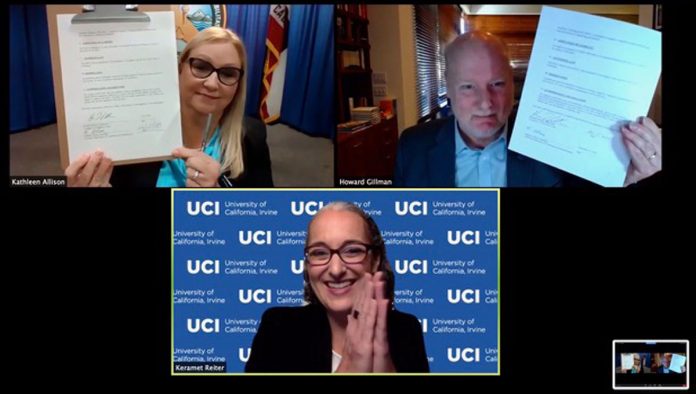
Southwestern College announced that students at the Richard J. Donovan Correctional Facility now have a pathway to earn a bachelor’s degree in sociology from UC Irvine. On Dec. 15, UC Irvine Chancellor Howard Gillman and California Department of Corrections and Rehabilitation Secretary Kathleen Allison formalized the Futures Through Educational Degrees initiative at a special virtual signing ceremony.
Southwestern College Restorative Justice program director Patrice Milkovich said its program, that began in the fall of 2015, serves justice system-impacted adults and juveniles through its relationship with Second Chance, a nonprofit that supports reentry and success through education as one of its four founding principles. She said SWC first became involved with education at Donovan through its continuing education with non-credit programs offered by the college.
Milkovich said it began with two classes in spring 2016 with an enrollment of slightly over 50 students. She said this is where her passion and purpose live.
“I have really enjoyed building this program,” she said. “When we went into Donovan, the amount of interest and the demand for college courses blew up. We could not provide enough classes to begin with. The more we recruited faculty and got them inside the prison with the program, they were so impressed with the level of intellect, the desire to learn and the respect for the faculty. They found these students outperformed any of their students on campus.”
Milkovich said in June 2016, SWC was one of 67 of the country’s colleges and universities selected to part of this experimental initiative offering an associate degree for transfer in business administration.
Milkovich said the initiative was instrumental in helping identify pathways for those incarcerated due to the limits of career eligibilities when individuals are released back into the community.
“We knew business and entrepreneurship was one of those areas of training that would support an individual once released from prison,” she said. “We built upon that program and we now have a cohort of 40 students in an associate’s degree for transfer program in sociology. Sociology, psychology, communications and business are the four golden disciplines that the community colleges in California are using to support the pathway to a degree inside a correctional facility. They are transferable and there is a real opportunity to go somewhere with those degrees.”
She said the goal was keeping the incarcerated from going back into the system and to do that they needed training and educational skills so they can get out and make a livable wage.
“This is where the chancellor’s office of community colleges became involved and saw an opportunity in 2015 to work with our correctional partners at CDCR to begin a pilot program to have faculty teach inside the walls of Donovan offering community college education to students eligible to receive access to the community colleges,” she said.
Milkovich said the distinction of Southwestern College’s ability to offer this robust curriculum inside Donavan is that it falls within its geographical service area, but that there has been some pushback from the community on spending money for prisoners’ education.
“There are studies, and we see numbers right now that show that incarcerated men and women who go through an educational program are 40 percent less likely to participate in the same crime they did that got them incarcerated,” she said. “The average cost to keep a person incarcerated is between $70,000 and $80,000 a year. So that 40 percent makes a direct impact.”
Milkovich said older tougher crime laws from the ’70s to the ’90s incarcerations were drug related, targeting minorities, and the three-strikes law filled prisons, expanding them beyond capacity, costing the taxpayers.
“For every dollar spent on education, the taxpayer is saving $4 to $5,” she said. “So financially and morally it makes sense. You can not throw away people’s lives. Ninety-five percent of the incarcerated population in this country is going to be released at some point. They are going to be your neighbor, your barber. We need to give them skills that they can be released and have something to work toward. We believe education supports all and everyone should have access to it regardless of where they live, who they are, and regardless of the worst possible thing they could have done in their lives.”
Milkovich said the recently signed memorandum of understanding will be the first USC university to be inside the state prison system. She said SWC had to articulate its degree with UC Irvine’s degree in the field of sociology.
“Several of our students in our sociology program at Donavan are eligible for release and a few were already released,” she said. “What we hope for in the fall of 2022, is that we will have graduated the cohort of sociology associate degrees and hopefully up to 30 of those men, if they have a 3.5 GPA or higher, will become eligible to transfer to UC Irvine.
“The program will commit to supporting these programs if they are released after they start the program, they will be welcomed on the UCI campus and continue the program outside.
“Quite a few of our incarcerated students have expressed their desire to get their advanced degree and come back and do what was offered to them. They want to teach inside the prison.”














